Del Mar Photonics
Germanium windows - featured customer Yeheng Wu
BOARD 98 THE DEVELOPMENT OF ONE-DIMENSIONAL, MULTILAYERED PVK/PVA
PHOTONIC CRYSTALS. Dora C. Huang, Yeheng Wu,
28118 Edgepark BIvd, Westlake OH 44145 (Hathaway Brown School).
Photonic crystals are known for their unusual properties regarding the
propagation of light and their bandgaps. A photonic bandgap, which contains many
of the same features of an electronic bandgap in a semiconductor, is a forbidden
region for photons (light). These bandgaps can be created with materials that
have a large difference in their refractive indices and can be viewed on a
transmission graph as a dip, with the dip representing low light transmittance.
The purpose of this project was to create a one-dimensional, multilayered,
polymer photonic crystal, where its bandgap could be viewed through a graph of
its transmission, taken from a spectrophotometer. It was hypothesized that the
experiment would produce such a crystal and that a dip in the transmission of
light would occur at visible to near infrared range on the graph, indicating a
bandgap with an expected width of 140 nm. The crystal (n=4) was created by spin
coating alternating layers of poly vinylcarbazole (PVK) and poly vinylalcohol (PVA).
The transmittance curve of the thirteen layer sample showed a 39 percent dip in
the transmission at 900 nm (near the center of the bandgap that stretched from
approximately 825 nm-990 nm), which provided evidence that the sample created
was the periodic structure desired. These one-dimensional photonic crystals can
be used to create very small lasers, when the crystal is doped with laser dye,
or added to a substance to create extremely white pigment.
more

|
Model |
Product
Name+ |
Buy Now |
|
CPPE-Ge-38.1-4 |
Germanium
circular plane parallel etalon, ø 38.1 mm x 4 mm |
 |
|
E-Ge-1.25-3 |
Germanium
etalon, ø 1.25" x 3" |
 |
|
E-Ge-12.7-25.4 |
Germanium
etalon, ø 12.7 mm x 25.4 mm (ø 0.5" x 1") |
 |
|
RAP-Ge-1 |
Germanium
right angle prism, 25.4x25.4x25.4 mm |
 |
|
W-Ge-114.3-5-AR |
Germanium
window, ø 114.3 mm x 5.0 mm, AR coated 8-12 micron |
 |
|
W-Ge-125-6 |
Germanium
window, ø 125 mm x 6 mm |
 |
|
W-Ge-125-6-8-12 |
Germanium
window, ø 125 mm x 6 mm, coating AR/DCL 8-12 µm |
 |
|
W-Ge-25.4-3 |
Germanium
window, ø 25.4 mm x 3 mm |
 |
|
W-Ge-38.1-4 |
Germanium
window, ø 38.1 mm x 4 mm |
 |
|
W-Ge-38.1-4-10.6 |
Germanium
window, ø 38.1 mm x 4 mm, coated 10.6 µm |
 |
|
W-Ge-50.8-3 |
Germanium
window, ø 50.8 mm x 3 mm |
 |
|
W-Ge-50.8-3 |
Germanium
window, ø 50.8 mm x 3 mm |
 |
|
W-Ge-50.8-5 |
Germanium
window, ø 50.8 mm x 5 mm |
 |
|
W-Ge-60-3-CTS |
Germanium
window, ø 60 mm x 3 mm |
 |
|
Displaying 1 to 14 (of 14 products) |
Result Pages: 1 |
request a quote for custom Germanium optics
Ge (Germanium) optical components -
windows
- etalons -
Diamond-like carbon coating -
buy online
Quantum Cascade Lasers Calibration
Customer wrote:
My application is calibrate the relative wavelength of tunable quantum cascade
lasers in the mid-infrared (~10 microns). The laser itself is used for remote
sensing of atmospheric gases.
FSR (Free Spectral
Range) is determined by etalon length L and wavelength of operation
λ
FSR= (λ2) / (2*n*L)
The most popular
standard etalon is 1 inch long
For longer wavelength (> 10 micron) it's often necessary to use etalons 2-3
inches long to get required accuracy of calibration.
Del Mar Photonics
offer variety of standard as well as custom germanium etalons.
Here are few
examples of Ge etalon specifications:
Ge
etalon part number #GEFPE1/0.5
request a quote - sold in
Greyhawk Optics nline store as part number
E-Ge-12.7-25.4
Length 1.00 +/- 0.01 inch
Diameter 0.50 +/- 0.05 inch
1/4 lambda flat each end, HeNe
parallel to 3 ARC SEC or better
length measure to 0.0005"
small bevels
surface quality F-f(80/50) per MIL-F-48616
Ge etalon part number #GEFPE3/1.25 -
request a quote
Length 3.00 +/- 0.01 inch
Diameter 1.25+/- 0.05 inch
Other specification as in #GEFPE1/05
Ge etalon part number #GEFPE20mm/1.5
Ge etalon part number #GEFPE20mm/1.5 -
request a quote
dia 38.1 (-0.1) mm
thickness: 20 (+/-0.1) mm
Flatness: 1 fringe ( Lambda/2 at 633 nm) , delta N = 0.2 fringes
Surface quality: 60-40 s/d
Parallelism: < 2 sec
Perpendicularity: 5 min
Using Ge etalon in gas sensing
project involving quantum cascade lasers
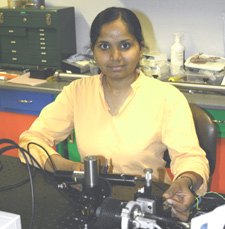 |
Jagadeeshwari (Esha) Manne, PhD student, University of
AlbertaProject: Infrared absorption
spectroscopy with Quantum cascade laser.
The advance of Quantum
cascade (QC) lasers fabricated by band structure engineering offers an
attractive new option for IR absorption spectroscopy. QC-DFB lasers are of
particular interest to gas-sensing applications because they emit single
frequency radiation which falls within the 3-15 um window, where the
fundamental absorption bands of most of the molecules are located.
Research Activities:
- QC laser characterization
- Exploring different strategies for trace gas detection and comparing
the detection limits and sensitivity for open-path measurements.
|
I am a
graduate student pursuing my doctoral studies at the University of Alberta. The
Ge- etalon will be used for non-profit research here at the university. I am
presently working on a gas sensing project involving Quantum cascade laser.
The mid-IR
region is ideally suited for absorption spectroscopy since the fundamental
vibrational transitions of a number of molecules lie here. Quantum cascade (QC)
lasers
fabricated by band structure engineering offer an attractive
new option for sensitive IR absorption spectroscopy. Distributed feed-back
pulsed QC lasers are of particular interest for they allow the realization of a
room temperature, compact IR source with relatively high output power. In
particular, their combination with the pulsed-CRDS technique
has the potential for high sensitivity trace gas analysis. The goal
of our present work is to develop a technique for quantitative online analysis
of trace constituents in exhaled breath. We are using pulsed-CRDS technique in
combination with a mid IR QC laser operating near 970 cm-1
to measure ammonia levels in exhaled breath. An unlocked
ring-down cavity was designed for these studies which can be operated at
atmospheric or reduced pressure. We have already attained a detection limit of
25 ppb for ammonia. We are in a process of improving the system to get down to
sub ppb levels with this technique.
The etalon will be used for
characterization of the laser which would be an important step in choosing the
right parameters for the laser for gas-sensing applications.
Del Mar Photonics>
Del Mar Photonics featured components
Del Mar Photonics continuously expands its components
portfolio.
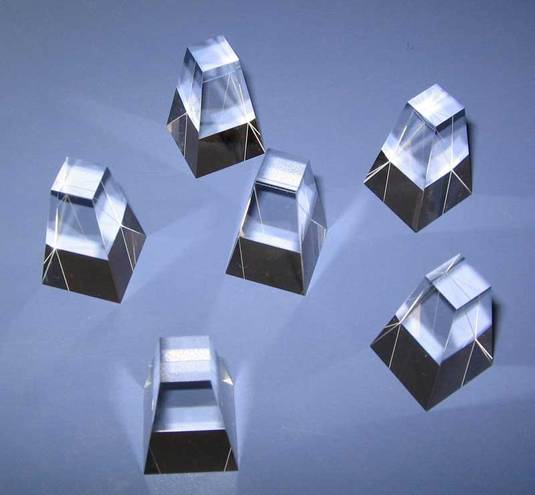
|
Solar
Prisms for Concentrating Photovoltaic Systems (CPV)
Solar cells made of compound semiconductors such
as gallium arsenide are very expensive. Usually very small cells are
installed and various means such as mirrors, lenses, prisms, etc..are used
to concentrate sunlight on the cells. Concentration photovoltaic technology
(CPV) uses the solar radiation with an efficiency of 40%, double that of
conventional solar cells
Del Mar Photonics design custom Concentrating Photovoltaic Systems (CPV) and
supply variety of the optical components for CPV such as
solar prisms shown in the picture.
hexagonal light pipes,
optical rods |
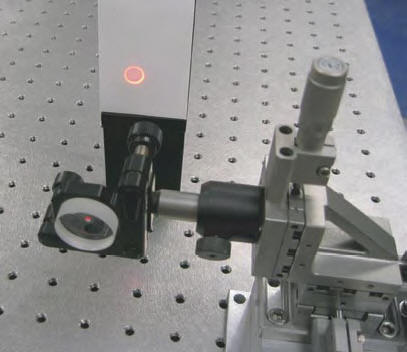
|
Axicon Lens
Axicon lens also known as conical lens or rotationally symmetric prism is
widely used in different scientific research and application. Axicon can be
used to convert a parallel laser beam into a ring, to create a non
diffractive Bessel beam or to focus a parallel beam into long focus depth.
Del Mar Photonics supplies axicons with cone angles range from 130° to
179.5° for use with virtually any laser radiation. We manufacture and supply
axicons made from BK7 glass, fused silica and other materials.
download brochure -
request a quote |
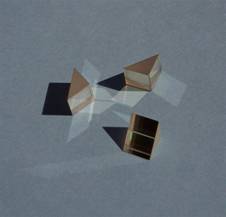 |
Rutile (TiO2) coupling
prisms
Del Mar Photonics offers optical elements made of high quality synthetically
grown Rutile Titanium Dioxide crystals. Rutile’s strong birefringency, wide
transmission range and good mechanical properties make it suitable for
fabrication of polarizing cubes, prisms and optical isolators. Boules having
high optical transmission and homogeneity are grown by proprietary method.
Typical boules have 10 - 15 mm in dia. and up to 25 mm length. Optical
elements sizes - from 2 x 2 x 1 mm to 12.7 x 12.7 x 12.7 mm. Laser grade
polish quality is available for finished elements. So far we the largest
elements that we manufactured are 12 x15 x 5 mm, in which optical axis is
parallel to 15 mm edge, 5 mm is along beam path, 12 x 15 mm faces polished
20/10 S/D, one wave flatness, parallelism < 3 arc.min. (better specs.
available on request).
more details -
download brochure -
request a quote |
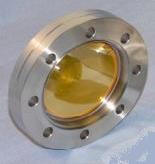 |
Vacuum viewport
Del Mar Photonics offer a range of competitively priced UHV viewports ,
Conflat, ISO or KF including a variety of coatings to enhance performance.
Del Mar Photonics viewports are manufactured using advanced techniques for
control of special and critical processes, including 100 percent helium leak
testing and x-ray measurements for metallization control. Windows Materials
include: Fused silica, Quartz , Sapphire , MgF2, BaF2, CaF2, ZnSe, ZnS, Ge,
Si, Pyrex. Standard Viewing diameters from .55" to 1.94 ".
Coating - a range of custom coatings can applied - which include
- Single QWOT
- Broad Band AR
- V coatings
- ITO
- DLC (Diamond like coating)
more
details -
request a
quote
|
 |
Hydrogen
Thyratrons are used in
such devices as radars with different power levels, high-power pulsed
technical, electrophysical, medical devices and lasers. Sophisticated
design and high quality ceramic-metal envelope determines long lifetime
and very accurate and reliable operation of hydrogen thyratrons under wide range of environmental
conditions.
Applications:
- radars
- pulsed lasers power supplies
- medical apparatus
- electrophysical instrumentation
Triggered Three-Electrode Spark Gap Switches are ceramic-metal sealed off gas
discharge trigatron-type devices with a co-axial trigger electrode. These Gas
Discharge Tubes contain no mercury and, due to an advanced design, feature high
reliability and a long lifetime being operating under wide range of
environmental conditions.
Applications:
- pulsed installation for processing materials
- installations with plasma focus
- pulse power supplies for lasers and other pulse equipment
- medical apparatus such as lithotriptors and defibrillators
- processing systems for petroleum wells |
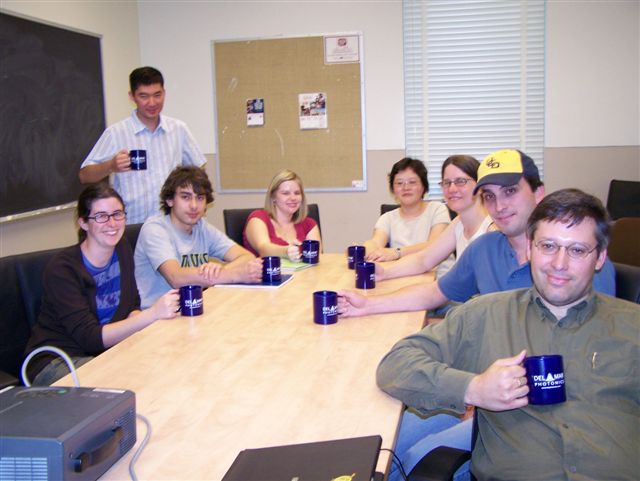 |
We are looking forward to hear from you and help you with
your optical and crystal components requirements. Need time to think about
it?
Drop us a line and we'll send you beautiful Del Mar Photonics mug (or
two) so you can have a tea party with your colleagues and discuss your
potential needs. |

Del Mar Photonics, Inc.
4119 Twilight Ridge
San Diego, CA 92130
tel: (858) 876-3133
fax: (858) 630-2376
Skype: delmarphotonics
sales@dmphotonics.com
![]()






